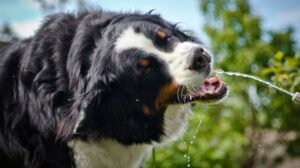
Identifying and Rectifying Four Common Dog Nutrition Mistakes
Sooner or later mistakes in dog nutrition will become apparent externally. Dogs that are overweight or underweight, have skin or coat problems or lose weight may also be suffering from digestive issues. You should consult your veterinarian if you notice any of the following signs in your dog. They could be signs of disease.
In comparison to cats, dogs aren’t as picky about their food. There are still some dog nutrition mistakes that can affect the health of your four-legged companion sooner or later. The following tips will help you to identify the mistakes and counteract them as soon as possible.
Incorrect nutrition can lead to overweight or obesity in dogs
Dog nutrition mistakes can cause weight fluctuations. Your dog may become overweight if he consumes more calories or energy than he uses. A dog will lose weight if it consumes less calories than it expends. This can be due to a number of reasons. Low-quality foods that contain too much grain, for example, can cause obesity in dogs because they have to consume more to satisfy their protein requirements and to satisfy their hunger. Caloric intake can exceed the requirements. Low-quality dog foods can lead to an underweight dog, because your dog is unable to utilize the ingredients, and excretes them all again.
Even high-quality food for dogs can cause overweight or underweight if the quantities are too large or small. In addition, if food is not adjusted to the life stage of the dog, it can lead to mistakes in nutrition. Puppies in the growing stage, for instance, require special food to ensure that they don’t grow too quickly, while still getting enough nutrition. Adult dogs have different requirements, and senior dogs need special food if they are suffering from kidney disease or other old age ailments.
Obesity can be caused by excessive calorie intake if the dog is often fed leftovers or treats. Obesity is often caused by a lack of exercise, while underweight is usually the result of too much activity. Caution. Caution. Ask the breeder, the animal shelter or the veterinarian about the best dog food to feed the dog of your choice.
Oily or dull coat
Dogs’ coats can show dietary mistakes. It is not just about grooming that makes a coat beautiful, but it’s also about nutrition and getting enough vitamins and essential nutrients. The coat will become dull and lackluster if the food is lacking in essential fatty acid or other nutrients. It is also possible to have too much: if your dog’s food contains too many fats, it can make the coat feel greasy and oily. Take your dog to the veterinarian if you’re unsure if the coat is dull or oily because of malnutrition. Your dog may be sick.
Skin problems caused by wrong dog food
Is your dog suffering from eczema, itching and skin redness? Is your dog’s skin dry, brittle and sensitive? This can be caused by errors in dog nutrition. Skin problems can be caused by a lack or excess of nutrients. Allergies can also be caused by food mites. Some dogs can be allergic to additives and ingredients in food, causing skin problems.
Dogs who have a poor diet can suffer from diarrhea or constipation.
A veterinarian should be consulted if your dog has digestive issues or abnormal bowel movements. In the event that your dog is otherwise healthy, diarrhea or constipation may be caused by a dietary error. If your dog excretes excessive amounts of feces due to a poor-quality food, it could be a sign that the dog is not able to digest its food. Food intolerances or low-quality food can cause diarrhea. Unsuitable dog foods can cause flatulence and constipation.

